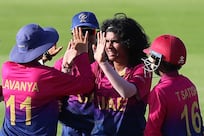Since the establishment of the Islamic Republic in 1979, no domestic group has embarrassed the authorities in Tehran more than Jundallah. Its deadly attacks not only highlight Iran's internal security predicament but also show the limits of Tehran's attempt to project strength at a time when Iran wants to be seen as a regional power.
The ethnic Baluch and Sunni group's latest blow came last month, when it carried out twin suicide attacks at the port of Chabahar. Targeting a Shiite religious procession, two teenage bombers killed some 40 people, making it the deadliest attack since armed Jundallah rebels first emerged in Iran's southeast region of Baluchistan in 2003.
But the terrorist strike did more than kill scores at an Iranian mosque. It also highlighted two simple truths about Jundallah's threat to Tehran. For one, it demonstrated the ability of the group to persevere despite repeated promises to eradicate it. Secondly, the attack came at a time when the regime of Ayatollah Ali Khamenei and the Iranian president Mahmoud Ahmadinejad speak of Tehran's invincibility in the face of its internal and foreign enemies. Jundallah poses a severe test of Iran's self-declared invincibility.
Compared to Iran's other established rebel groups - such as the ethnic Kurds or the Mujahadeen e-Khalq (MEK) - the modus operandi of Jundallah is infamous due to the shock value of its operations. It was the first to carry out a beheading of a government security officer in 2005. By December 2008, it introduced suicide missions in Iran as part of its strategy.
Jundallah's endurance is no less striking. From the moment its initial limited raids on the Iran-Pakistan border grew to become large-scale ambushes of security forces deep in Iranian territory, Tehran has again and again vowed the group's annihilation. No organ in Iran has taken the challenge of Jundallah more seriously than the powerful Islamic Revolutionary Guards Corps (IRGC).
As Jundallah became bolder, the IRGC took charge of security of Baluchistan in 2008. This transfer of command, however, only raised the stakes. All-out war was declared on the rebels when, in October 2009, a number of visiting senior IRGC commanders were killed in a suicide bombing at the border town of Pishin. IRGC's long-awaited revenge came in February 2010 when Jundullah's 20-something leader, Abdolmalek Rigi, was captured.
Five months later, and after Rigi's televised confessions, Iran celebrated the demise of Jundallah by hanging Rigi. But that celebration turned out to be premature, and as the group's attacks continue it is clear that Tehran's counterterrorism trial in the southeast did not come to an end when Rigi faced the gallows.
Iran has always accused the US, Britain and Israel to be the benefactors of Jundallah, this despite the fact that Washington in November officially designated the group as a terrorist organisation. But even if Iran's allegations are true, many domestic critics have also suggested that Tehran find local remedies to solve the problem of Jundallah rather than obsess over any ties it has with foreign powers. These critics have pointed to the dire socioeconomic conditions in Baluchistan that have allowed a group that is otherwise despised across Iran's political spectrum to flourish.
In early January, IRGC Chief Commander Mohammad Ali Jafari was evidently in agreement with such voices. In declaring that the IRGC was again returning the security mandate to local forces, Jafari said the "IRGC has created safe conditions for economic enterprises" in the region and that it was time for "[government] ministries and investors to move in."
Though it may have been too little and too late, it was nonetheless an admission that stability in this part of Iran cannot occur without economic regeneration and some level of local buy-in. Indeed, reaching out to tribal Baluch leaders is touted as the IRGC's principal counter-terrorism success and yet, Jundallah's latest attack showcased the limitations of Tehran's deterrence posture.
Officials in Tehran have also been far more specific in their allegations of foreign influences over the group, saying that it is the Pakistani intelligence services that handle Jundallah operatives. A number of IRGC officials have called more urgently for Islamabad to take action against Jundallah sanctuaries on its soil.
Threats against Pakistan have also entered the Iranian media with Fars News recently warning that"Iran can use its missiles to hit Jundallah bases in Pakistan" and that "public opinion in Iran expects action".
For now, Pakistani officials are mainly engaged in issuing denials about harbouring Jundallah and label the group a joint problem. Rehman Malik, Pakistan's interior minister, has hinted that Jundallah is linked with the Baloch Liberation Army (BLA), and the jihadist Lashkar-i-Jhangvi (LJ) and Tehrik-i-Taleban Pakistan (TTP).
Either way, the fate of the Jundullah movement and Iran's south-eastern region rests largely in Tehran's hands. To address its security challenges Iran will have to reorient its traditionally hard-line security based-approach in Baluchistan and develop a more nuanced strategy of bettering the lives of ordinary Iranian Baluchis. Claiming success and blaming others may play well in the press, but it won't solve one of Iran's most pressing domestic security challenges.
Alex Vatanka is an Iranian-born scholar at the Middle East Institute in Washington DC




